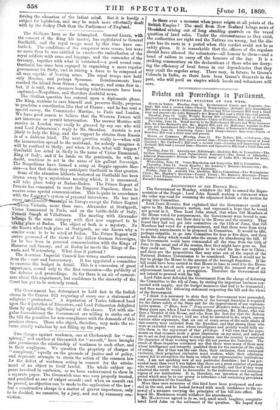The Sicilians have so far triumphed. General Lanza, With the
consent of the King his master, has capitulated to General
Garibaldi, and the royal troops must by this time have em- barked. The conditions of the conqueror were severe, but were no more than he was entitled to exact—the embarkation of the royal soldiers with arms and baggage, and the surrender of the treasury, together with what it contained—a good round sum. Garibaldi has since been engaged in organizing a more regular government for Sicily, and in raising a force to be composed of
all men capable of bearing arms. The royal troops now hold only Messina, and perhaps Syracuse. Reinforcements have reached the island from Genoa ; men, money, and arms flow in ; but, it is said, two steamers bearing reinforcements have been captured—Neapolitan, and therefore doubtful news.
The Sicilian question has entered upon a diplomatic phase. The King, anxious to save himself and preserve Sicily, proposes to proclaim a constitution like that of France ; and he has sent a special envoy, the Commander Martino, to Paris and London. We have good reason to believe that the Western Powers will not intervene or permit intervention. The answer Martino will receive in London may easily be guessed by any one who will read Lord Palmerston's reply to Mr. Sheridan. Austria is not likely to help the King, and the support he obtains from Russia is of a dubious kind. The next question really is—when will the insurrection spread to the mainland, for nobody imagines it will be confined to Sicily, and when it does, what will happen ?
Garibaldi has acted in Sicily in the name of Victor Emmanuel, King of Italy, and if he lands on the peninsula, he will, no Garibaldi has acted in Sicily in the name of Victor Emmanuel, King of Italy, and if he lands on the peninsula, he will, no
doubt, continue to act in the name of his gallant Sovereign. The Neapolitans have formed a camp at Reggio opposite Mes- sina—a fact that shows they anticipate Garibaldi in that quarter. Some of the attention hitherto bestowed on Garibaldi has been drawn away by a mysterious meeting which, it is announced, will take place today at Baden-Baden. The Prince Regent of Prussia has consented to meet the Emperor Napoleon, there to receive some special communication. This is quite in accordance
with the En_earesor's system of personal interviews. He has met
every siderabC ...r.likaiersign in Europe except the Prince Regent wen Victoria, more than once, Alexander at Stuttgardt, Victor Emmanuel in Paris, and on the battle-fields of Italy, Francis Joseph at Villafranca. The meeting with Alexander belongs to the same category with that now supposed to be taking place at Baden. The object of both is a mystery. No one knows what took place at Stuttgardt, no one knows why a similar scene is to be acted at Baden. The Prince Regent will arrive possessed of the views of his fellow German Sovereigns, for he has been in personal communication with the Kings of Hanover and Saxony, and at Baden he meets the Kings of Ba- varia and Wurtemberg. What does it portend ?
The Austrian Imperial Council has wrung another concession from the ( ourt and bureaucracy. It has appointed a committee to examine the budget in detail. This is a concession of great importance, second only to the first concession—the publicity of the debates aid proceedings. So far there is an air of earnest- ness about this experiment, but confidence in the sincerity of the Court has yet to be seriously tested.


























 Previous page
Previous page